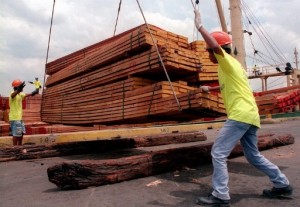Not all sectors ready for Asean Free Trade Area

Workers unload a shipment of imported Malaysian lumber for the Philippine market in this file photo. AFP FILE PHOTO
DAVAO CITY, Philippines—The increasing cost of power would reduce the competitiveness of the country’s rubber exporters when the Asean Free Trade Area or Afta comes into full effect, an industry source said.
The manufacture of rubber-based products has been identified as among key priority investment sectors in the Association of Southeast Asian Nations when Afta takes effect in 2015.
Bonifacio Tan, chief executive officer of Farma Rubber Industries Inc., told a forum on Afta organized by the regional office here of the Department of Trade and Industry on Thursday that electricity currently accounts for up to 50 percent of the cost of processing rubber in the country.
Tan said that in contrast, rubber processors in other Afta countries, including Malaysia, enjoy lower cost of electricity.
With the cost of electricity still increasing, Tan said, processors such as Farma Rubber, which exports 350 tons of crumb (dried and processed) rubber to Malaysia a month, might eventually opt to export cuplumps (or raw, unprocessed rubber).
“It will not affect us adversely but small farmers will have smaller incomes because we will be exporting raw rubber products instead,” Tan said.
Bayan Muna Representative Carlos Zarate said it appeared that the only way to stop the spiraling of the cost of power was to regulate the power industry anew.
“Of course, it would be better if the energy sector is once again regulated, its control returned to the government so that this kind of problems would not arise. As it is now, the private operators are the ones decisive in the whole spectrum of the energy industry, including plant maintenance, and they can create an artificial energy crisis if they want to,” Zarate said in a statement.
Raymond Astillas Sr., trade and industry specialist and head of the Asean desk at the Bureau of International Trade Relations of the Department of Trade and Industry, noted that that homegrown Philippine companies such as Goldilocks and Jollibee were making their presence felt abroad.
Astillas said the Singapore branches of Goldilocks and Jollibee have been attracting long customer queues.
But he admitted that some sectors were not adequately prepared for Afta. These include the agriculture sector.
Astillas said the sugarcane industry for one will have a hard time competing with cheaper sugar imports expected to flood the market once Afta opens it up in 2015.
With a report from Judy Quiros, Inquirer Mindanao